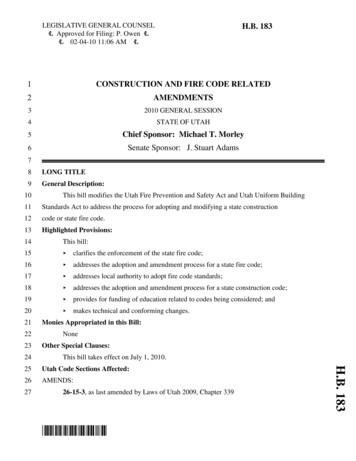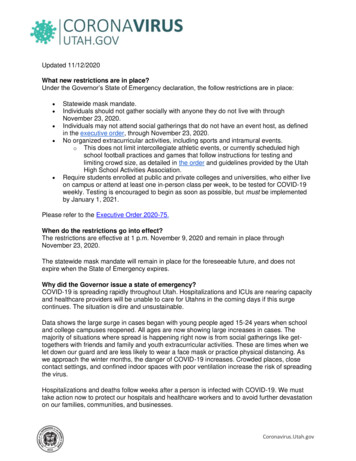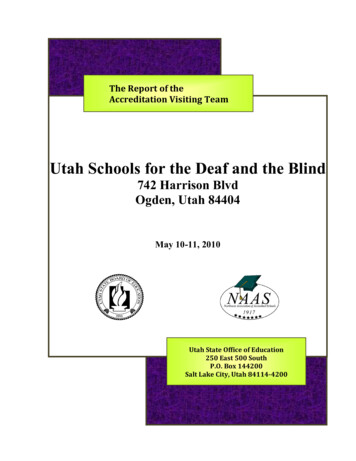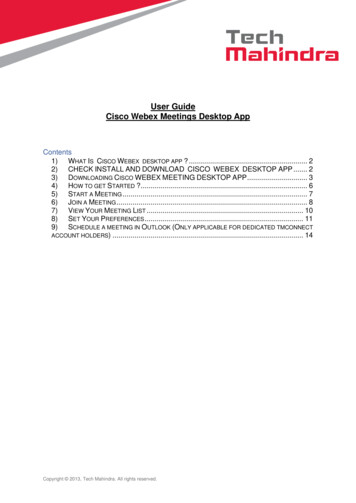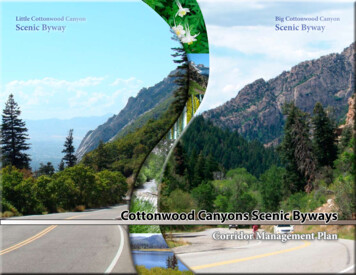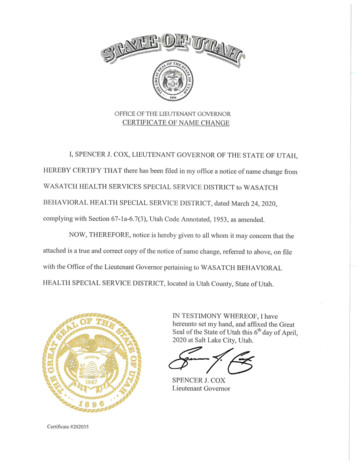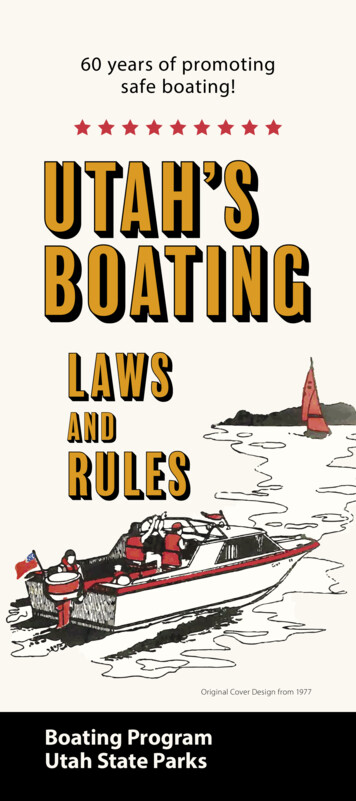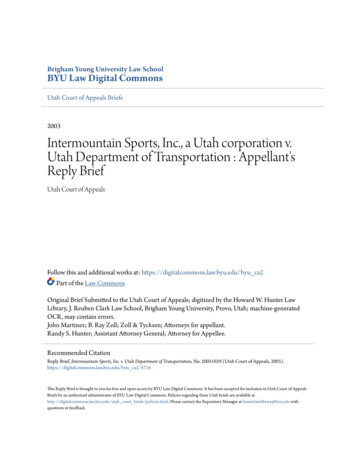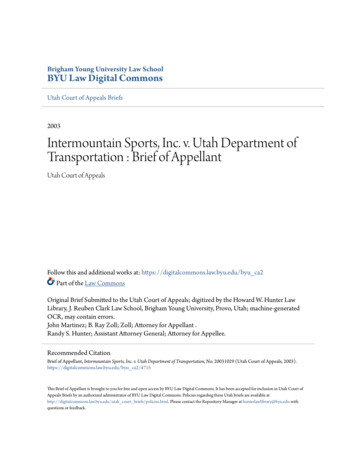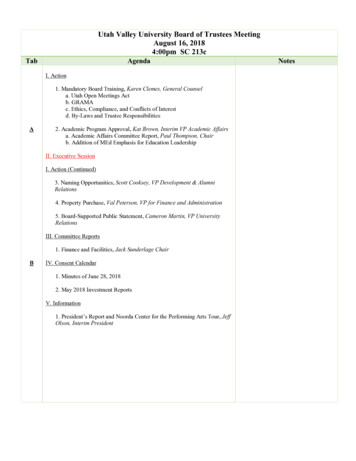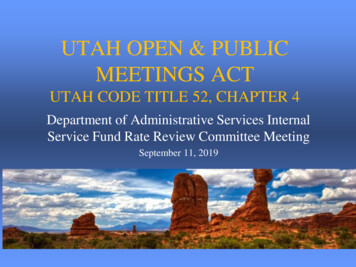
Transcription
UTAH OPEN & PUBLICMEETINGS ACTUTAH CODE TITLE 52, CHAPTER 4Department of Administrative Services InternalService Fund Rate Review Committee MeetingSeptember 11, 2019
Why do we do this?“The presiding officer of the publicbody shall ensure that the members ofthe public body are provided withannual training on the requirementsof this chapter.”Utah Code § 52-4-104
Declaration of Public Policy Utah Code §52-4-102 (1) The Legislature finds and declares that the state, its agencies andpolitical subdivisions exist to aid in the conduct of the peoplesbusiness.(2) It is the intent of the Legislature that the state, its agencies and itspolitical subdivisions : (a) take their actions openly; and (b) conduct their deliberations openly.
UTAH OPEN & PUBLICMEETINGS ACT WHAT DOES THE OPEN MEETINGSACT DO?– “It requires government to take actions openly.”– “Ensures deliberations allow for an open publicprocess.”In other words, we want the people to knowwhat is going on with state government.
Who Is Subject To This Law? “Public Body” defined by Utah Code § 524-103(9) A Public Body means any “administrative,advisory, executive, or legislative body ofthe state or its political subdivisions” that:1. Is created by the Utah Constitution, statute,rule, ordinance, or resolution;2. Consists of two or more persons;3. Expends, disburses, or is supported inwhole or in part by tax revenue; and4. Is vested with authority to make decisionsregarding the public’s business.
Who Is Subject To This Law?2017 Legislative Session included areference to 53A-1, Part 16 “Public SchoolMembership in Associations” where anassociation: Consists of two or more persons Expends, disburses, or is supported inwhole or in part by dues paid by a publicschool and Is vested with authority to makedecisions regarding the participation of apublic school or student in interscholasticactivities.
Examples– City or County Councils– City or County Council Advisory Boards Planning & zoning Board of adjustments Project committees– Special Districts DABC Commission– State Records Committee– Board of Pardons
Cardiff Canyon Owners Assoc. v. Mountain Accord July 10, 2017 decision from Judge Laura Scott, 3rd DistrictCourt, Salt Lake County The Mountain Accord initially was a joint or cooperativeundertaking because all of the parties were public agencies. Consequently, Mountain Accord is a “public body” subjectto the requirements of OPMA. Each of the public entities acting alone “would beunquestionably subject to the OPMA.” The Courtconcluded that a private entity’s participation in a joint orcooperative undertaking does not take Mountain Accord“beyond the reach of the OPMA.”
in other wordsWhen in doubt, hold a public meeting.
Who Is Not Subject to the OpenMeetings Act Law? Political parties, groupsand caucuses State Legislativeconference, rules andsifting committees School communitycouncil, established under53A-19-108 The EconomicDevelopment LegislativeLiaison Committee (2017Change)
Utah Code § 52-4-103(5)(a) WHAT IS A MEETING?– “Meeting” means the convening of a public body, witha quorum present, including a workshop or anexecutive session whether the meeting is held in personor by means of electronic communications, for thepurpose of discussing, receiving comments from thepublic about, or acting upon a matter over which thepublic body has jurisdiction or advisory power.”
Utah Code § 52-4-103(5)(b) WHAT DOES “MEETING” NOT MEAN?– A chance meeting– A social meeting– Meeting of a public body with both legislative andexecutive responsibilities where: No public funds are appropriated for expenditure Meeting solely for discussion or to implementadministrative/operational matters for which no formal actionby the public body is required Meeting solely for discussion or to implementadministrative/operational matters that would not come beforethe body for discussion or action
What is a Quorum? § -103(10)(a) “Quorum” means a simplemajority of the membership of a public body,unless otherwise defined by applicable law § -103(10)(b) “Quorum” does not include ameeting of two elected officials by themselveswhen no action, either formal or informal, is takenon a subject over which these elected officialshave advisory power
Attendance at MeetingsUtah Code § 52-4-207 DO I HAVE TO ATTENDMEETINGS, OR CAN IT BEHELD WITHOUT PEOPLE INTHE SAME ROOM?– Can meet by phone or otherelectronic means which allowsall participants to hear or observecommunications Must be adopted into existingrules/ordinance Notice requirements stillapply Public must have a means toattend or participate
Utah Code § 52-4-202 NoticeRequirements ARE THERE ANY NOTICE REQUIREMENTS? Yes, notice requires all of the following:– Must be posted as a written notice at the place where themeeting will be held– By posting notice to the “Utah Public Notice Website” UtahCode § 63F-1-701– Must be given to at least one local general circulationnewspaper or local media correspondent– At least 24 hours prior to meeting post: Agenda including all action items stated with reasonablespecificity Date Time Place
Utah Code § 52-4-202(2)(a) NoticeRequirements In addition to the requirements underSubsection §52-4-202(1), a public bodywhich holds regular meetings that arescheduled in advance over the course of ayear shall give public notice at least once ayear of its annual meeting schedule.
Utah Code §52-4-201, -204 & -205Closed Meetings CAN A MEETING BE CLOSEDTO THE PUBLIC? IF SO WHEN?– An open meeting can be closed for thefollowing purposes:– A meeting is open to the public unlessclosed under § 52-4-204, -205 or -206– Discussing an individual’s character,professional competence, or physical ormental health– Strategy sessions to discuss collectivebargaining– Strategy sessions to discuss pending orreasonably imminent litigation
Closed Meetings (Cont.) An open meeting can be closed for the following purposescontinued:– Discussions regarding security personnel, devices orsystems– Investigative proceedings regarding allegations ofcriminal misconduct– Strategy sessions to discuss the purchase, exchange,lease or sale of water rights or water shares if publicdiscussion would disclose the appraisal/estimated valueof the property under consideration; or would preventthe transaction from being completed under the bestpossible terms
Closed Meetings (Cont.) An independent Legislative Ethics Commission orLegislative Ethics Committee review of ethics complaints A county legislative body discussing commercialinformation. Strategy sessions to discuss the purchase, exchange, leaseor sale of real property Public notice of the terms and public approval of salerequired Water rights shares under certain conditions
Are There Any Meetings That Must BeClosed? NO.NOTE: A closed meeting is not allowed unless each matterdiscussed in the closed meeting is permitted under Utah Code § 52-4205. The decision to close a meeting to the public isalways discretionary, not mandatory. The law doesnot require any meeting to be closed. EXEPTIONS The following must be closed:– A meeting of the Health and Human ServicesCommittee to review a fatality review report– A meeting of the Child Welfare Legislative OversightPanel to review a fatality review report
Utah Code §52-4-204 Closing Meetings IS THERE A PROCESS TO CLOSE MEETINGS? YES, 52-4-204– A Quorum must be present.– Two-thirds of the members present must vote to close themeeting.– The body must first hold an open public meeting withproper notice before entering into the closed meeting.– The body must publicly disclose: Note: there areseparate requirements in subsections (B), (C) & (D) The vote by name of each member for or againstentering into the closed meeting The reasons for holding the closed meeting Location of the closed meeting
What Is Forbidden During A ClosedMeeting? You may not:– Approve anyordinance, resolution,rule, regulation,contract orappointment– Interview a person tofill an elected position– Take final action– Final votes must beopen and on therecord (except asallowed specificallyby statute)
WHAT ABOUT EMERGENCIES?Utah Code § 52-4-202 The law allows formeetings for “emergencyor urgent” matters if:– The best notice practicableis given– The minutes include astatement of the unforeseencircumstances that made themeeting necessary
RECORDS OF OPEN MEETINGS(Utah Code § 52-4-203) DO WE HAVE TO KEEP MINUTES AND/ORRecordings? YES TO BOTH! Even though there is a recording, the approved writtenminutes will be the official record. include both written minutes and recording of openmeeting as public records. Public body shall establish and implement procedures forthe public body’s approval of the written minutes eachmeeting
What Are The Requirements ForKeeping Minutes of Open Meetings? All minutes must include– Date/time– Place of meeting– Names of all members present or absent In addition minutes of open meetings must include––––All matters proposed, discussed or decidedAll names and substance of information from individuals giving testimonyIndividual votes on each matterAny additional information requested by a member
What are the Requirements For KeepingMinutes of Closed Meetings? Minutes of closed meetings must include– The names of all members present– The names of others present at the closed meeting, unless itinfringes on the purpose of the closed meeting– The closed meeting must be recorded and shall be completeand unedited Note: There may be exceptions to this requirementsee § 52-4-206(6)(a) and (b)–Detailed written minutes may be kept– Minutes and/or recordings of closed meetingsare not public records.
Utah Code §52-4-203(4) Minutes andRecordings of Open Meetings WHEN ARE THE MINUTES OFMEETINGS PUBLIC?– Written minutes and recordings of openmeetings are public records pursuant to UtahCode § 63G-2-101 et seq. (GRAMA) and shallbe released within a reasonable amount of time.
Written minutes shall be available to the public before finalapproval when the minutes are only awaiting formal approval. The minutes released prior to final approval must be identifiedas “unapproved”. The recording of a open meeting must be made available within3 business days. A public body may satisfy the requirements that minutes includethe substance of matters proposed, discussed or decided or thesubstance of testimony or comments by maintaining a publiclyavailable online version of the minutes that provides a link to themeeting recording at the place in the recording where the matteris proposed, discussed, or decided or the testimony or commentsprovided (2017 change).
Electronic MessageTransmissions Utah Code § 52-4-210 The Open PublicMeetings Act does not restrict members ofa public body from transmitting anelectronic message to other members of thepublic body when the body is not in an openmeeting.
WHAT HAPPENS IF SOMEONEVIOLATES OPMA? -302 & -305 A court can void any action in violationof the law– Sometimes a violation can be“cured” by discussing and taking apublic vote in a subsequent meeting– May have to pay court costs andattorneys fees– “In addition to any other penaltyunder this chapter, a member of apublic body who intentionallyviolates or intentionally abets oradvises a violation of the closedmeeting provisions of this chapter isguilty of a class B misdemeanor.”(6 mos. Jail and/or 1,000.00 fine)
Common Violations Of OPMA– Discussing matters in a closed meeting that should bediscussed during the open session– Taking official or final action in a closed meeting– Closing meetings without members of the body votingfirst in an open meeting to close the meeting– Conducting a closed meeting for reasons other thanthose allowed by OPMA– Failing to properly provide notice of a public meeting– Failing to provide adequate notice of a public meeting
WHO CAN ENFORCE OPMA?––––The courtsThe Attorney GeneralA County AttorneyA private citizen who is an aggrieved party
UTAH OPEN & PUBLICMEETINGS ACT HOW LONG DOES A PARTY HAVE TOPURSUE CORRECTIVE ACTION?– 90 Days– 30 Days if it involves, bonds, notes, or debt
UTAH OPEN & PUBLICMEETINGS ACT QUESTIONS?
Utah Code § 52-4-202 Notice Requirements ARE THERE ANY NOTICE REQUIREMENTS? Yes, notice requires all of the following: -Must be posted as a written notice at the place where the meeting will be held -By posting notice to the "Utah Public Notice Website" Utah Code § 63F-1-701 -Must be given to at least one local general circulation
